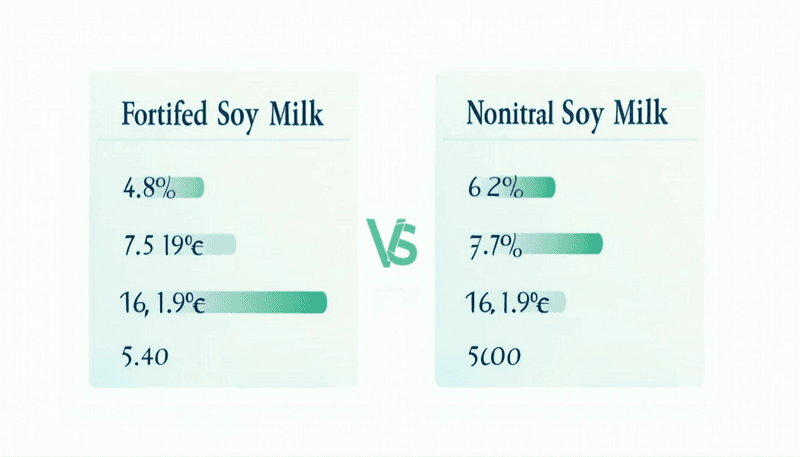Soy Milk: Friend or Foe?

Let's have a heart-to-heart about something that's probably caught your eye in the grocery store - soy milk. As a medical professional who's spent years studying women's health, I've watched the plant-based milk revolution unfold, and wow, has it been fascinating! A recent comprehensive review published in the journal Foods has shed new light on soy beverages, and I'm excited to share what this means for you.
The Nutrient Powerhouse You Might Be Missing
Did you know that soy milk is actually one of the closest plant-based alternatives to cow's milk when it comes to protein content? This isn't just any protein - we're talking about high-quality protein that contains all the essential amino acids your body needs. Think of it as having a complete toolkit for your body's daily repair and maintenance work.
"But doesn't soy contain those scary-sounding phytoestrogens I've heard about?"
Let's clear this up once and for all. The isoflavones (that's the scientific name for these plant compounds) in soy actually work differently than human estrogen. They can be more like a thermostat, helping to regulate your body's hormone levels rather than throwing them out of whack.
Fortification: The Game-Changer
Here's something that really caught my attention in the research: 60% of soy beverages in the market are fortified with calcium and vitamins. This is huge! It means manufacturers are actively working to ensure you're not missing out on key nutrients when you make the switch from dairy.
Pro tip: When choosing a soy milk, look for ones fortified with:
- Calcium (at least 300mg per serving)
- Vitamin D
- Vitamin B12
- Vitamin A
Think of fortification like putting a safety net under a trapeze artist - it's there to catch any nutritional gaps in your diet.
The Myth-Busting Truth About Soy and Health
Let's address those whispered concerns about soy and health effects. The research review tackled several controversial topics head-on, and here's what you need to know:
- Thyroid Function: For most people with normal thyroid function, moderate soy consumption poses no risk
- Fertility: No evidence supports claims that soy reduces fertility
- Hormonal Balance: Research shows soy can actually help maintain healthy hormone levels, especially during perimenopause
"Remember: moderation is key - aim for 1-2 servings of soy products daily."
I had a patient, Sarah, who was initially terrified of soy because of something she read online. After reviewing the science together and starting with small amounts, she found that adding soy milk to her morning smoothie actually helped with her perimenopausal symptoms.
The research clearly shows that quality matters. Look for organic soy milk when possible, and check that ingredient list - the shorter, the better!
Making the Switch: Practical Tips
- Start with small amounts in familiar foods (coffee, smoothies, oatmeal)
- Try different brands to find your favorite taste and texture
- Check the sugar content - unsweetened varieties are best for daily use
- Store properly (refrigerate after opening and use within 7-10 days)
Conclusion: Your Next Steps
The science is clear: soy milk can be a healthy addition to your diet, offering unique benefits while helping you maintain a balanced, nutritious lifestyle. The key is choosing high-quality, fortified options and incorporating them sensibly into your daily routine.
Ready to give soy milk a try? Start with this simple challenge: Replace your usual milk with fortified soy milk in your morning coffee or smoothie for one week. Notice how you feel and any changes in your energy levels or digestion.
Your Action Step: Next time you're at the grocery store, take a moment to read the labels on different soy milk brands. Look for one that's fortified with calcium and vitamins, and has minimal added sugars. Your body will thank you for making this informed choice!
Remember, the journey to better health is about making small, sustainable changes. Whether you're looking to reduce your dairy intake, boost your protein consumption, or simply try something new, soy milk might just be the addition your wellness routine needs.

Dr. Marcus Anthony Bennett
Dr. Marcus Bennett is a Seattle-based freelance medical writer and consultant specializing in mid-aged women's health. With a background in internal medicine and over a decade of experience in preventive care, he is dedicated to making complex health topics accessible. Dr. Bennett completed his MD at Johns Hopkins School of Medicine and residency at the University of Washington. His empathetic and evidence-based approach combines traditional medical expertise with a focus on health disparities, often incorporating practical lifestyle advice. Known for his clear, engaging communication, Dr. Bennett provides actionable insights to empower his audience.







